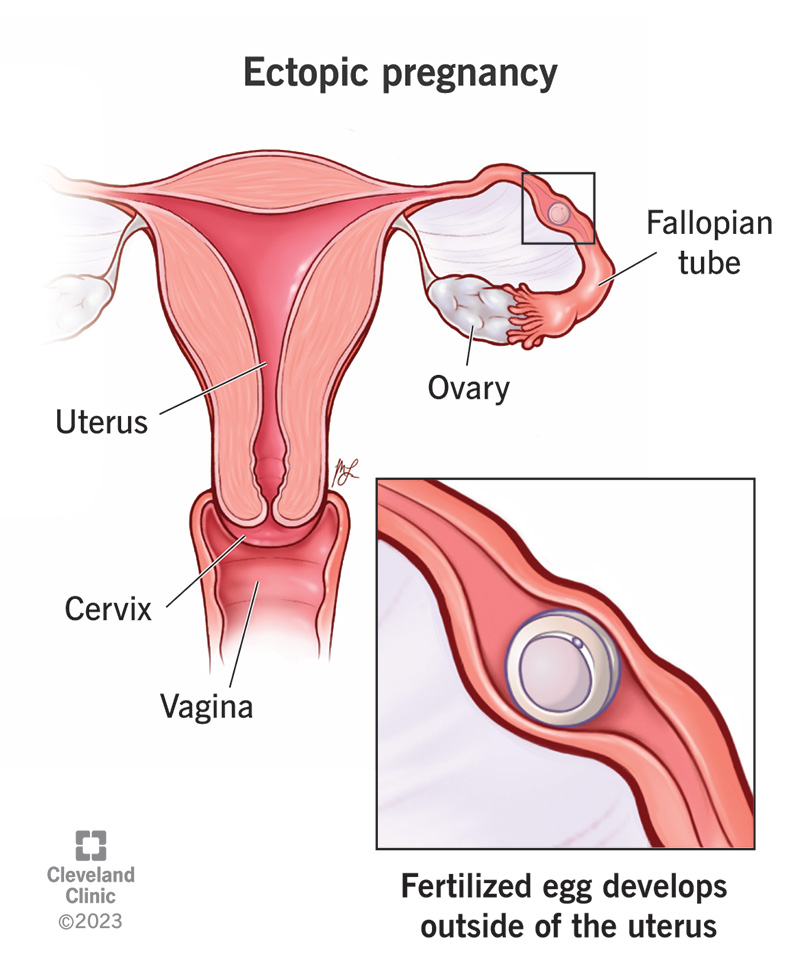Ectopic Pregnancy: Signs, Symptoms, and Treatment
An ectopic pregnancy occurs when a fertilized egg implants outside the uterus. This can be a life-threatening condition for the mother, as it can lead to internal bleeding and organ damage.
Signs and Symptoms of Ectopic Pregnancy
The signs and symptoms of an ectopic pregnancy can vary depending on the location of the implantation. However, some common signs and symptoms include:
- Abdominal pain: This is the most common symptom of an ectopic pregnancy. The pain may be sharp or stabbing, and it may come and go.
- Vaginal bleeding: This is another common symptom of an ectopic pregnancy. The bleeding may be light or heavy, and it may be accompanied by cramping.
- Nausea and vomiting: These are also common symptoms of an ectopic pregnancy. They may be accompanied by diarrhea.
- Shoulder pain: This is a less common symptom of an ectopic pregnancy. It occurs when blood from the ruptured ectopic pregnancy irritates the diaphragm.
- Lightheadedness or dizziness: These symptoms may occur if the ectopic pregnancy ruptures and causes internal bleeding.
Risk Factors for Ectopic Pregnancy
There are a number of risk factors for ectopic pregnancy, including:
- Pelvic inflammatory disease (PID): This is an infection of the female reproductive organs. It can damage the fallopian tubes, which can increase the risk of an ectopic pregnancy.
- Endometriosis: This is a condition in which tissue from the lining of the uterus grows outside the uterus. It can block the fallopian tubes, which can increase the risk of an ectopic pregnancy.
- Previous ectopic pregnancy: Women who have had an ectopic pregnancy are at an increased risk of having another one.
- Tubal ligation: This is a surgical procedure to block the fallopian tubes. It is a permanent form of birth control, but it can increase the risk of an ectopic pregnancy if the fallopian tubes are not completely blocked.
- Intrauterine device (IUD): This is a small device that is inserted into the uterus to prevent pregnancy. It is a very effective form of birth control, but it can increase the risk of an ectopic pregnancy if the IUD is not inserted correctly.
Diagnosis of Ectopic Pregnancy
An ectopic pregnancy can be diagnosed with a combination of physical examination, blood tests, and ultrasound.
- Physical examination: During a physical examination, the doctor will check for signs of an ectopic pregnancy, such as abdominal pain, vaginal bleeding, and shoulder pain.
- Blood tests: Blood tests can be used to measure the levels of hCG, a hormone that is produced during pregnancy. High levels of hCG can indicate an ectopic pregnancy.
- Ultrasound: Ultrasound is a imaging test that can be used to visualize the uterus and fallopian tubes. Ultrasound can be used to confirm the diagnosis of an ectopic pregnancy.
Treatment of Ectopic Pregnancy
The treatment for an ectopic pregnancy depends on the location of the implantation and the severity of the symptoms.
- Medical treatment: Medical treatment can be used to treat ectopic pregnancies that are located in the fallopian tubes. The doctor will inject a medication called methotrexate into the ectopic pregnancy. Methotrexate will stop the growth of the ectopic pregnancy and allow it to be absorbed by the body.
- Surgery: Surgery is necessary to treat ectopic pregnancies that are located outside the fallopian tubes. The doctor will remove the ectopic pregnancy and any damaged tissue.
Complications of Ectopic Pregnancy
Ectopic pregnancy can lead to a number of complications, including:
- Internal bleeding: This is the most serious complication of ectopic pregnancy. It can occur if the ectopic pregnancy ruptures.
- Organ damage: Ectopic pregnancy can damage the fallopian tubes, ovaries, and other organs.
- Infertility: Ectopic pregnancy can increase the risk of infertility.
Prevention of Ectopic Pregnancy
There is no sure way to prevent ectopic pregnancy, but there are a number of things that women can do to reduce their risk, including:
- Avoiding pelvic inflammatory disease (PID): PID can be prevented by practicing safe sex and getting regular pelvic exams.
- Treating endometriosis: Endometriosis can be treated with medication or surgery.
- Getting regular pelvic exams: Pelvic exams can help to identify and treat conditions that can increase the risk of ectopic pregnancy.
- Using birth control: Birth control can help to prevent pregnancy, which can reduce the risk of ectopic pregnancy.
Ectopic pregnancy is a serious condition, but it can be treated if it is diagnosed early. If you are experiencing any of the signs and symptoms of ectopic pregnancy, it is important to see your doctor right away.
